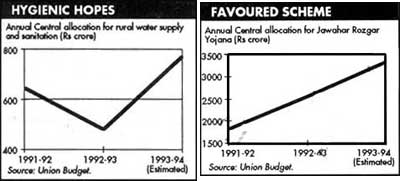Poverty alleviation: investment or mere sop?
Poverty alleviation: investment or mere sop?

The provisions in agriculture are equally growth-oriented, says JNU vice chancellor Y K Alagh, who is an agricultural economist. "The most dangerous thing in the rural sector was the drying up of credit flow. This budget has reversed that," he says.
Alagh is most critical of the budgetary provisions for higher education, arguing that it is too soon choke off funding for higher education because it will take time to convince the private sector to finance higher education and until this happens, these institutions would be crippled. But Dinesh Mohan, a professor at the Indian Institute of Technology in Delhi, sees the cuts as "forcing higher education into the clutches of business houses."
Provisions for health care also appear to be inadequate. At Rs 779 crore, the outlay for 1993-94 is only a marginal increase over that of 1992-93. The positive signs, says Amit Sengupta of the Delhi Science Forum, are the lowering of customs duty on bulk drugs, drug intermediates and on components required to produce medical equipment. This could make drugs and medical equipment cheaper. But the cost of health care, says Sengupta, will depend substantially on the drug policy likely to be announced shortly. With liberalisation, drug prices have been going up, not down.
| PRIVATE LESSONS | |||
| Lower allocations for higher education mean academic institutions will have to seek private sector financing | |||
| (Rs crore) | |||
| Year | UGC | IITs | IIMs |
| 1991-92 1992-93 1993-94 |
401.71 431.44 419.82 |
111.71 137.80 136.00 |
17.59 19.10 15.58 |
The budget's bottom line is that it aims at securing maximum growth while improving welfare measures as much as possible. The finance minister said recently, "I have increased handsomely the provisions for those programmes that would have a direct bearing on the alleviation of poverty." The question on many minds now is whether Manmohan Singh's poverty alleviation plans represent an investment with substance or a mere sop.
Reported by Uday Shankar, Anumita Roychowdhury, Nitya Jacob and Koshy Cherail.







